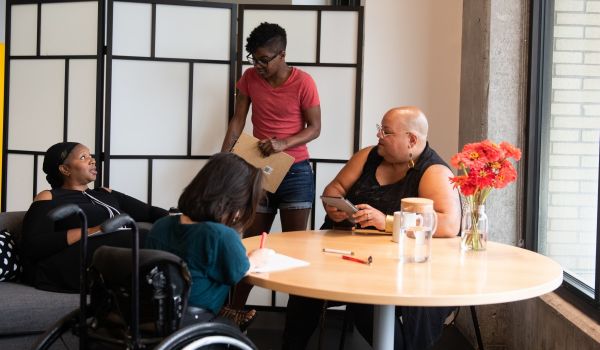Welcome to The Weekly Wrap, our Friday round-up of stories that explain the problems oppressing people in cities and elevate the solutions bringing us closer to economic, environmental and social justice.
Oregon Lawmakers Weigh Rollbacks of Drug Decriminalization
An Oregon policy that decriminalized the use of all drugs in trace amounts has been facing criticism and opponents are pushing for rollbacks, according to NPR. Measure 110 passed through a ballot referendum in November 2020, when voters approved a system where people publicly using hard drugs were served with a citation rather than arrested. The fine could be waived if the person received a health assessment at a drug treatment center. Taxes from marijuana sales would go toward funding the drug treatment centers as well as harm reduction like safe syringe distribution. Next City covered the law in January 2021. But drug overdose deaths have increased since the law was introduced, which detractors blame on the law. Others point to an inflow of fentanyl and an increase in homelessness, which can lead to desperation and higher rates of substance use. Drug use also spiked across the country as a result of the pandemic.
While funding for drug treatment has increased, the infrastructure is still lacking, NPR found, and most people are not following up on assessments after they get cited. But Oregon Public Broadcasting found that the legislature and two governors failed to make suggested improvements, including training police on how to implement the law and changing how the citation system works.
Kansas Repeals Subminimum Wage for Disabled Workers
Mother Jones reports that Kansas has passed legislation that will make it illegal to pay disabled people below minimum wage. The practice has been legal in most states since 1938, when the Fair Labor Standards Act created the minimum wage. Kansas is not an anomaly: 14 other states that once allowed this practice phased it out prior to 2023, including California, Maryland, Oregon and Washington. In all other states, companies who want to pay below the minimum wage have to apply for a certificate from the Department of Labor, a practice that is currently under review. The Fair Labor Standards Act also excluded tipped workers and agricultural workers, exemptions that are still the norm. Thirty-four states also have minimum wage exemptions for youth, according to the Economic Policy Institute.
Illinois Bill Proposes Single-Family Zoning Ban
An Illinois bill proposes banning single-family zoning in eight cities across the state, including Chicago, according to The Real Deal. The law would be phased in between 2025 and 2026. It allows for “missing middle” housing — which is more dense than a home but not as dense as a multifamily apartment — to be built on previously single-family-zoned lots. It leaves the specifics of what type of housing could be built to the Illinois Housing Development Authority. While more states have been softening or doing away with single-family zoning, the results have been mixed. A single-family zoning ban in Minneapolis, for instance, resulted in just 20 building permits for duplexes and triplexes in areas previously zoned for single-family housing.
FBI Tracked Anti-Pipeline Protestors for Years Before Dakota Access Project
Documents obtained by Grist and Type Investigations reveal that the FBI was monitoring anti-pipeline protests as early as 2012, when it began a “counterterrorism” assessment on activism in South Dakota after a pipeline protest by Native activists in that state. The investigation found that years before the Keystone XL pipeline protests became national news, “the federal government was already developing a sweeping law enforcement strategy to counter any acts of civil disobedience aimed at preventing fossil fuel extraction.” The FBI referred to certain Native American activist groups as “environmental extremists” and a potential source of violence despite the fact that they had not engaged in any illegal activity during protests.
New York City Plans To Build New Ports For Shipping As Congestion Pricing Looms
Gothamist reports that New York City is planning to build new maritime freight hubs so that companies can ship items along the city’s waterways rather than on its roads. It’s an attempt to make shipping cheaper for companies once congestion pricing rolls out. The city’s Economic Development Corporation announced a request for proposals for design firms to build barges in Hunt’s Point in the Bronx, the Lower East Side, Stuy Town and the Financial District in Manhattan, and Gowanus Bay in Brooklyn. The EDC predicts these barges would result in 6,240 fewer trucks on the road. The city’s waterways were once filled with shipping boats, part of what made it a global metropolis in the first place.
Also, the MTA has halted contracts for subway upgrades, because of the litigation risks it faces related to congestion pricing, according to CityLab.
Curated by Deonna Anderson
MORE NEWS
-
A $1 billion highway capping project in Buffalo is dividing the city. CityLab
-
New York City quietly closed enrollment centers for municipal IDs. Gothamist
-
The case for leaving behind moveable chairs in public places. Philadelphia Citizen
-
What if public housing were for everyone? Vox
RESOURCES
-
AARP is inviting local nonprofit organizations and governments across the country to apply for its 2024 AARP Community Challenge grant program, which funds “quick-action projects that help communities become more livable by improving public places, transportation, housing, digital connections, and more.” Apps are due by March 6 at 5:00 p.m. Eastern. Learn more here.
EVENTS
-
Feb. 21 at 12 p.m. Eastern: Next City is hosting transportation expert Jarrett Walker for a conversation about his new book, Human Transit, Revised Edition, and how to achieve successful public transit that will enrich any community. Register here.
-
Feb. 22: The Solutions Project is hosting a conversation about Black-led climate solutions. Speakers include Gloria Walton, president and CEO of The Solutions Project, Naomi Davis, CEO of Blacks in Green, Crystal Hayling, executive director of The Libra Foundation, and Vann R. Newkirk II, senior editor at The Atlantic. Learn more and register here.
This article is part of The Weekly Wrap, a newsletter rounding up stories that explain the problems oppressing people in cities and elevate the solutions bringing us closer to economic, environmental and social justice. Click here to subscribe to The Weekly Wrap newsletter.

Roshan Abraham is Next City's housing correspondent and a former Equitable Cities fellow. He is based in Queens. Follow him on Twitter at @roshantone.


















